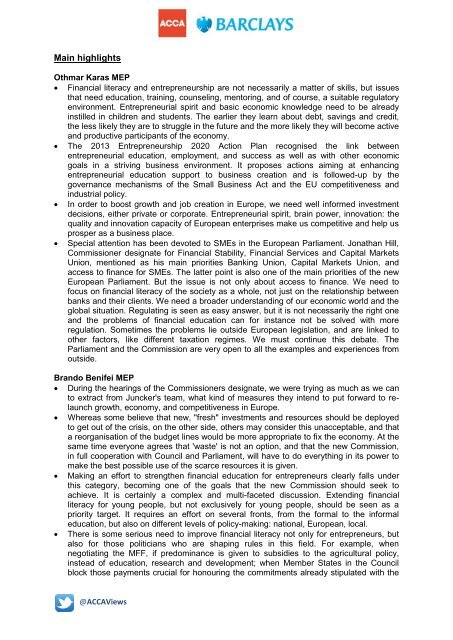Research Article for study 722
Create successful ePaper yourself
Turn your PDF publications into a flip-book with our unique Google optimized e-Paper software.
Main highlights<br />
Othmar Karas MEP<br />
Financial literacy and entrepreneurship are not necessarily a matter of skills, but issues<br />
that need education, training, counseling, mentoring, and of course, a suitable regulatory<br />
environment. Entrepreneurial spirit and basic economic knowledge need to be already<br />
instilled in children and students. The earlier they learn about debt, savings and credit,<br />
the less likely they are to struggle in the future and the more likely they will become active<br />
and productive participants of the economy.<br />
The 2013 Entrepreneurship 2020 Action Plan recognised the link between<br />
entrepreneurial education, employment, and success as well as with other economic<br />
goals in a striving business environment. It proposes actions aiming at enhancing<br />
entrepreneurial education support to business creation and is followed-up by the<br />
governance mechanisms of the Small Business Act and the EU competitiveness and<br />
industrial policy.<br />
In order to boost growth and job creation in Europe, we need well in<strong>for</strong>med investment<br />
decisions, either private or corporate. Entrepreneurial spirit, brain power, innovation: the<br />
quality and innovation capacity of European enterprises make us competitive and help us<br />
prosper as a business place.<br />
Special attention has been devoted to SMEs in the European Parliament. Jonathan Hill,<br />
Commissioner designate <strong>for</strong> Financial Stability, Financial Services and Capital Markets<br />
Union, mentioned as his main priorities Banking Union, Capital Markets Union, and<br />
access to finance <strong>for</strong> SMEs. The latter point is also one of the main priorities of the new<br />
European Parliament. But the issue is not only about access to finance. We need to<br />
focus on financial literacy of the society as a whole, not just on the relationship between<br />
banks and their clients. We need a broader understanding of our economic world and the<br />
global situation. Regulating is seen as easy answer, but it is not necessarily the right one<br />
and the problems of financial education can <strong>for</strong> instance not be solved with more<br />
regulation. Sometimes the problems lie outside European legislation, and are linked to<br />
other factors, like different taxation regimes. We must continue this debate. The<br />
Parliament and the Commission are very open to all the examples and experiences from<br />
outside.<br />
Brando Benifei MEP<br />
During the hearings of the Commissioners designate, we were trying as much as we can<br />
to extract from Juncker's team, what kind of measures they intend to put <strong>for</strong>ward to relaunch<br />
growth, economy, and competitiveness in Europe.<br />
Whereas some believe that new, "fresh" investments and resources should be deployed<br />
to get out of the crisis, on the other side, others may consider this unacceptable, and that<br />
a reorganisation of the budget lines would be more appropriate to fix the economy. At the<br />
same time everyone agrees that 'waste' is not an option, and that the new Commission,<br />
in full cooperation with Council and Parliament, will have to do everything in its power to<br />
make the best possible use of the scarce resources it is given.<br />
Making an ef<strong>for</strong>t to strengthen financial education <strong>for</strong> entrepreneurs clearly falls under<br />
this category, becoming one of the goals that the new Commission should seek to<br />
achieve. It is certainly a complex and multi-faceted discussion. Extending financial<br />
literacy <strong>for</strong> young people, but not exclusively <strong>for</strong> young people, should be seen as a<br />
priority target. It requires an ef<strong>for</strong>t on several fronts, from the <strong>for</strong>mal to the in<strong>for</strong>mal<br />
education, but also on different levels of policy-making: national, European, local.<br />
There is some serious need to improve financial literacy not only <strong>for</strong> entrepreneurs, but<br />
also <strong>for</strong> those politicians who are shaping rules in this field. For example, when<br />
negotiating the MFF, if predominance is given to subsidies to the agricultural policy,<br />
instead of education, research and development; when Member States in the Council<br />
block those payments crucial <strong>for</strong> honouring the commitments already stipulated with the<br />
@ACCAViews





